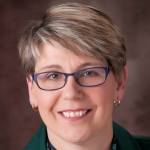ANTICOAGULANT MEDICATIONS and the high risks associated with them pose many challenges for even the best-prepared pharmacist.
In 1985, the ASHP Research and Education Foundation confronted this problem head on by developing its first-ever traineeship program in the area of antithrombotic pharmacotherapy. The program provides trainees with the tools they need to make the best decisions for their patients when it comes to blood-thinning medications.
Key Players on Patient-Care Teams
Fast forward 28 years, and the need to equip pharmacists to manage patients’ medication therapies is more important than ever. Today, the Foundation has expanded its offerings to include additional traineeships in critical care, oncology patient care, and pain and palliative care. A pharmacogenomics traineeship is being considered.
“We offer training in areas that have been identified by ASHP members as major needs,” said ASHP Foundation Vice President Daniel J. Cobaugh, Pharm.D., FACCT, DABAT, who oversees the traineeships. “These are areas in which extremely high-risk medications predominate, and the Foundation is focused on making sure that knowledgeable pharmacists are key players on these patient-care teams.”
Creating New Opportunities
Carolyn O’Donnell, R.Ph., BCOP, formerly a clinical pharmacist at Pennsylvania’s Lancaster General Health, dove into an oncology traineeship in 2011 at The Johns Hopkins Hospital, Baltimore, after becoming a board-certified oncology pharmacist a year earlier.

Carolyn O’Donnell, R.Ph., BCOP, third from left, works with the Lancaster General Health e-Health team, including (from left) Mike Kling, Christine Cox, and Miska Yost.
O’Donnell’s experience there enabled her to create a new dosing protocol for raising hemoglobin levels which helps anemic patients treated at the Ann B. Barshinger Cancer Institute of Lancaster General Health.
“My protocol enabled pharmacists to adjust doses of epoetin based on a combination of hemoglobin levels and a pharmacy and therapeutics committee-approved algorithm,” said O’Donnell, now a clinical applications analyst for e-Health at Lancaster General Health.
The protocol, which keeps patients’ doses therapeutic without wide swings in their doses and lab results, “has been positively received by both patients and oncology providers,” she noted.
The knowledge that O’Donnell gleaned from the ASHP Foundation traineeship also helped her to advance her career in an unexpected way. In June 2012, O’Donnell transferred from the inpatient pharmacy department to the information technology department (e-Health) at Lancaster… a move that better utilizes her oncology expertise and one that still requires a pharmacist’s medication-use knowledge and experience.
“I’ve spent the last year developing standardized protocols using evidence-based content from the National Comprehensive Cancer Network, which provides standardized recommendations through chemotherapy templates,” she said. Combined with validation of content and practices at Lancaster General Health, the protocols have provided the groundwork for the development of a new Epic Beacon application that was implemented this month.
“I find this work to be extremely challenging and satisfying,” O’Donnell said. “I definitely feel like the ASHP Foundation traineeship deepened my clinical oncology knowledge and opened up opportunities for me that I might not have otherwise had.”
Paying It Forward
To ensure that trainees have the best experience, the ASHP Foundation selects faculty members from the nation’s top hospitals and health systems. Bradley Burton, Pharm.D., clinical pharmacy specialist in medical oncology at The Johns Hopkins Hospital, oversaw the 2012 oncology traineeship. Dr. Burton believes the program has a “pay it forward” aspect in that many trainees he has taught go on to become teachers themselves in their own workplaces.
“The program exposes trainees to a wide variety of oncologic disease states and clinical topics that they may not have had formal experience or training with,” Burton said. “By broadening their knowledge bases, trainees are able both to apply the concepts they learned to patients whom they care for and to teach their colleagues.”
Kristine Vaden Tuttle, Pharm.D., BCPS, a research clinical pharmacist with Novant Health Oncology Specialists, part of the Novant Health Forsyth Medical Center, Winston Salem, N.C., conducted her oncology traineeship under Burton and found the experience eye-opening.
“Not only did we spend time with Dr. Burton, but he also arranged time for us to meet with other clinical pharmacists to see other service lines,” said Tuttle. “In addition, he worked into the schedule a few Tumor Board discussions and several small group meetings in which we learned of their new research. It’s hard to believe how much we were able to experience in just two weeks.”
Trainees typically complete a distance-education pathway of between 40 to 80 hours before heading to in-person training sessions at predetermined sites for five to 14 days. The foundation’s program is tuition-based, with costs ranging from $3,200 to $7,500.
Experience Leads to New Drug Therapy Services
Some trainees use personal experiences with a disease state to inform their desire to battle it. When both of Glenn Williams’s parents received cancer diagnoses in the 1990s, he had some initial difficulty answering all of their questions.
Through his experiences with an ASHP Foundation oncology traineeship in 2012, Williams, B.S., R.Ph., a clinical pharmacist with SSM Cancer Care, in St. Louis, Mo., can now address his patients’ questions with authority.
“The experience helped me to create and implement medication therapy services (MTS) at our outpatient clinic,” he said, noting that MTS is Missouri’s version of a collaborative practice agreement.
“Under its guidelines, I can now independently initiate, alter or modify medication therapy according to specific protocols. This has been a dramatic change in my pharmacy practice, and it has ultimately improved patient outcomes.”
Editor’s Note: Want to know more about the ASHP Foundation oncology traineeships? Simply go to the blog on the Foundations’s website.
–By Evan Mulvihill











 If you want to contribute tutorials, news or other stuff please contact us. We pay 150 for each approved article.
If you want to contribute tutorials, news or other stuff please contact us. We pay 150 for each approved article. Consectetur adipisicing elit. Sed do eiusmod tempor incididunt ut labore.
Consectetur adipisicing elit. Sed do eiusmod tempor incididunt ut labore. This site uses valid HTML and CSS. All content Copyright © 2010 Newscast, Inc
This site uses valid HTML and CSS. All content Copyright © 2010 Newscast, Inc If you like what we do, please don't hestitate and subscribe to our
If you like what we do, please don't hestitate and subscribe to our